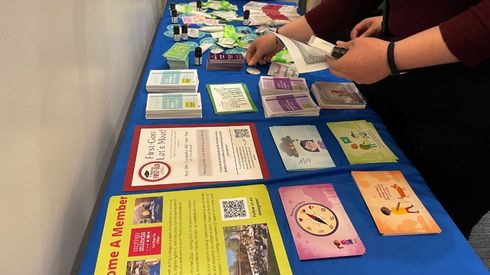Practical tools, resources the focus of suicide prevention training at City College
Knowing what to look for and where to get help can be the key to saving a life

Attendees of a suicide prevention training at San Diego City College pick up mental health literature and self-care items at the City College suicide prevention training. Photo by Kathryn Gray/City Times
September 23, 2022
Stopping by a table filled with literature on mental health resources and assorted essential oils, San Diego City College ASG treasurer Tammy Williams’ eyes lit up.
“I’m here because I want to be an advocate for others and myself and to be able to recognize mental health warning signs,” said Williams, a business administration major.
Williams was one of around 40 attendees that shuffled into the MS-162 auditorium on a sunny September afternoon before taking their seats at the suicide prevention training presented by City Student Mental Health and the City Active Minds chapter.
Before beginning her presentation, San Diego Youth Services HERE Now and Anti-BIAS program manager Amy Chavez required attendees of the suicide prevention training to agree to maintain a respectful and safe space while there.
Chavez also encouraged people to step out of the room or use self-soothing tactics if the content of the presentation or conversation got too heavy.
Using the analogy of putting the oxygen mask on yourself in an airplane before helping others, Chavez stressed the importance of taking care of yourself when dealing with others who are struggling.
“Be gentle with yourself and others during challenging times and assume the best,” Chavez said. “It is a lot easier said than done, but it can be really critical.”
With the goal of helping to reach zero suicides in San Diego through her work, Chavez thinks increased education on practical tools and resources to address mental health is an important step in reaching that goal.
Simply knowing what to look for can save a life, Chavez explained. Nine in 10 people who die by suicide show warning signs and 70% will share their thoughts about suicide with others.
Changes in mood, behavior or language can be clear warning signs, Chavez said.
Some other specific things to look for are someone talking about hopelessness or feeling trapped, showing loss of interest in activities, or crying often and sleeping or eating too much or too little, she explained.
There is a possibility that someone in a mental health crisis will lash out or isolate out of fear when you speak to them, Chavez said, but there are a few tools that can help make the process easier.
“There is a chance the conversation will go poorly and the person will be upset later,” Chavez said. “Do not take it personally. At least you have planted seeds in their mind about the possibility that there is a problem.”
Remembering the acronym ACT, which stands for acknowledge, care, act, can be really helpful in navigating conversations about suicide, according to Chavez.
Acknowledging the warning signs, showing you care about others and yourself, and talking about these conversations with someone you trust can lead to more successful outcomes, she said.
The U.S. National Suicide Prevention Lifeline 988, changed from 1-872-472-4091, is another easy way to access help, Chavez explained. The Lifeline can direct you to immediate resources for yourself or someone else 24 hours a day in more than 200 languages.
View this post on Instagram
“We want it to be a viable way for people to quickly know how to access support way faster,” Chavez said. “How many of you are going to walk out of here memorizing the 1-872-472-4091?”
San Diego State psychology major and City College alum Angelica Jimenez, who still keeps up with mental health awareness events on campus, was grateful she was able to attend.
“These events are very useful,” Jimenez said. “The speaker was very well spoken on how to give advice or how to talk to people without going through some mental distress.”
To stay informed about the latest Mental Health department news, resources and events sign up for The Mindful City newsletter, and follow @sdcitymentalhealth and @active_minds_sdcitycollege on Instagram.
To schedule an appointment with Student Mental Health click here or call (619) 388-3055.
Suicide Lifeline: If you or someone you know may be struggling with suicidal thoughts, you can call or text the U.S. National Suicide Prevention Lifeline at 988 or chat online any time of day or night.












